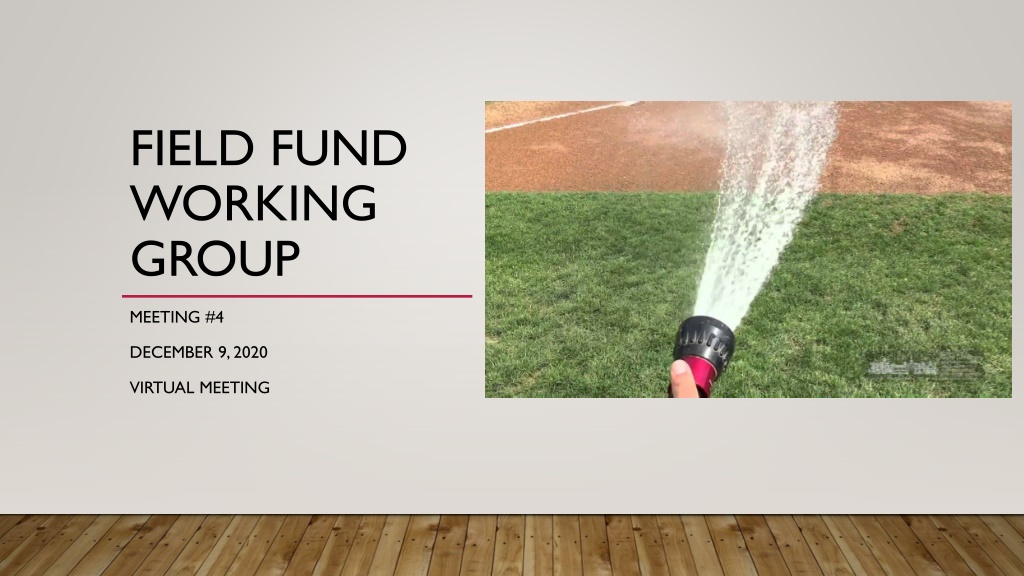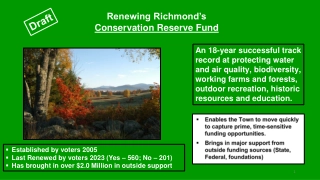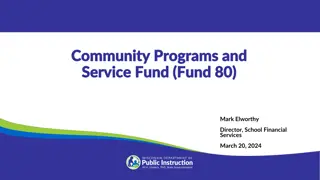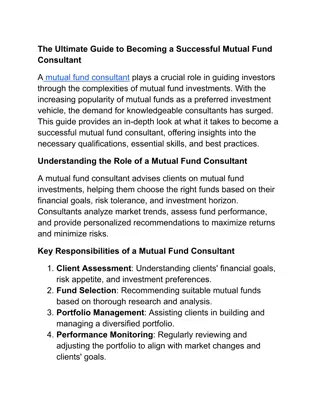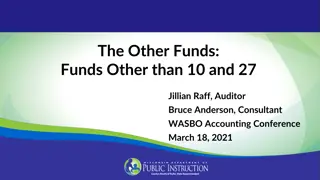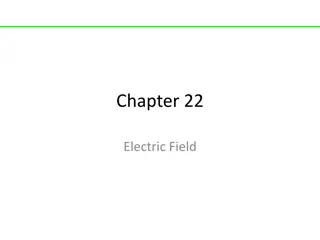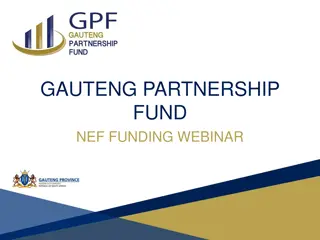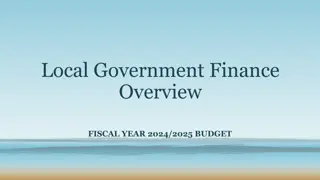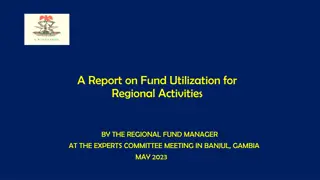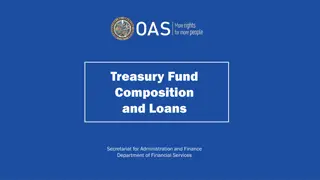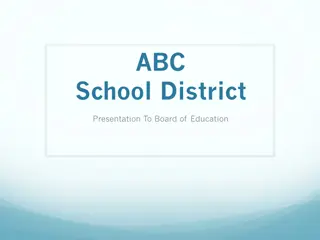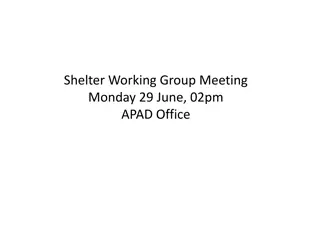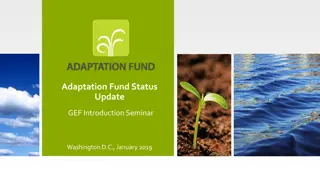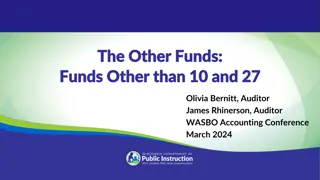Field Fund Working Group Meeting Insights and Analysis
The Field Fund Working Group Meeting #4 held on December 9, 2020, virtually discussed various topics related to field fund allocations, fee considerations, and capital improvement plans. The meeting covered important aspects such as benchmarking, investment in capital projects, recurring field maintenance, and equity considerations. Additionally, the meeting reviewed the Field Fund Working Group Draft Timeline, FY2021 Capital Improvement Plan, and Field Fund usage for athletic fields in Arlington. Key questions were raised regarding the appropriate fee levels, allocation strategies, and support for staff. The meeting aimed to provide recommendations and strategies for managing the Field Fund effectively.
Download Presentation

Please find below an Image/Link to download the presentation.
The content on the website is provided AS IS for your information and personal use only. It may not be sold, licensed, or shared on other websites without obtaining consent from the author. Download presentation by click this link. If you encounter any issues during the download, it is possible that the publisher has removed the file from their server.
E N D
Presentation Transcript
FIELD FUND WORKING GROUP MEETING #4 DECEMBER 9, 2020 VIRTUAL MEETING
FIELD FUND WORKING GROUP DRAFT TIMELINE Meeting #5 January 2020 Meeting #4 December 2020 Meeting #2 October 2020 Meeting #3 November 2020 Meeting #1 September 2020 Process Overview Review All DPR Sports Program Fees Benchmarking Review Explore Key Implementation Questions For Field Fund Strawman review of new proposed fee. Review Commission Recommendations Discuss Draft Recommendations Charge Overview Review Previous Field Fund Implementations FFWG recommendations for new fee and implementation. Discuss current fee levels. Outline process for allocating funds Field Fund Review Review Recreation v. Travel field allocations.
MEETING #4 TOPICS Meeting #3 Follow Up Items FY2020 Capital Improvement Plan (CIP) Re-Payment Options Benchmarking Jurisdictional Benchmarking Wrap-Up New Fee Considerations New Field Fund Options & Projections Review of Charge Objectives & Working Group Progress
FIELD FUND WORKING GROUP TOPICS OF CONSIDERATION Is the fee for use of athletic fields in Arlington set at the correct level? Should different fees for Recreation and Travel programs be considered? Should the field fund be allocated for investment in Capital projects? Should the field fund be allocated for recurring field maintenance? Should field funds be held in separate diamond field and rectangular field accounts? Should field funds be allocated to support more staff? How to view the field fund through an equity lens?
FY2021 CIP Current one-year FY2021 Capital Improvement Plan (CIP) Field Fund - $225,000 Revenue source dedicated to the replacement and construction of synthetic turf fields and diamond field enhancements. Funds "pool" over time until a specific project is identified (not a "use it or lose it" situation) Capital budget load is based on the previous years' revenue projections during the budget planning process (i.e.- $225k in capital funds loaded in FY21 is based on previously projected FY20 revenue) Reconciliation of capital budget to actual revenue received is performed by the end of each calendar year Synthetic Turf Program - $773,000 Replacement of the rectangular synthetic field at Virginia Highlands Park. Link to previous FY 2019-2028 CIP. Page C-47
CIP FUNDING OPTIONS Typically, field projects are funded in the following ways: Pay as you Go (PAYG)- ongoing or one-time net tax support from general fund revenues, (also includes Field Fund user fees). (no useful life requirement) Short-Term Financing- Projects usually include technology, public safety equipment and synthetic field replacement. (3-10 year useful life of asset required) General Obligation (GO) Bonds- Long term debt financing. A referendum appears on the ballot in November of even years for citizens to vote on. (10+ year useful life of asset required) Other Partnership Funding- Dedicated sources of funding based on specific agreements in place. (no useful life requirement, unless detailed in agreement)
BENCHMARKING Jurisdiction Total Fields Total Athletic Field Staff Field Maintenance Budget City Alexandria 60 21 $916,000 ($93,000 Seasonal) Arlington County 96 10 $1,441,781 Loudoun County 300+ 54 $6,847,500 Fairfax Park Authority 266 43 $7,610,338
BENCHMARKING - FAIRFAX In-House Responsibilities Funding in the amount of $7,610,338 is provided for athletic field maintenance. Trash Removal Fencing Repair Mowing Soil Samples Weed Control Field Lighting Irrigation Infield Preparation Fertilizer Insect Control General Fund Transfer $6,135,338 and Athletic Services Fee $1,475,000.
BENCHMARKING - FAIRFAX Athletic Field Maintenance -$2,700,000 Maintenance of lighting systems Irrigation maintenance Personnel Minor repairs Utilities Diamond Field Maintenance - $1,000,000 Athletic Fields at FCPA site Consistent mowing Diamond Field preparation twice weekly $250,000 Athletic Services Fee $750,000 General Fund Fairfax County Public Schools - $860,338 Mowing at elementary and middle schools Provides consistent mowing schedule Aeration & over-seeding Action Plan Review Team (APRT) - $50,000 Provides annual funding to girls softball fields Maintenance for dugouts, fencing, irrigation Custodial Support - $275,000 Indoor facility support Supported by Athletic Services Fee Synthetic Turf Funding - $1,209,375 Supports 44 FCPS synthetic turf fields Funded jointly by FCPS and Park Authority
BENCHMARKING - FAIRFAX Athletic Services Fee Synthetic Field Replacement 95 synthetic fields in Fairfax County 24 FCPS 71 Park Authority Establish replacement cycle over 10 year period $2,250,000 is included for the turf field replacement program $1,450,000 General Fund $800,000 from the Athletic Services Fee
BENCHMARKING FAIRFAX FIELD CLASSIFICATIONS Permit holders shall have first rights for the use of the fields to which they have been assigned. A field not being utilized by a permit holder can be used by others, including the "walk-on" public, as defined in Park Regulations. Use periods of Park Authority Fields shall be limited as follows: Diamond Fields: After 4 p.m. on the last Friday in March to the end of the first full weekend* in November. Rectangle Fields: After 4 p.m. on the last Friday in March to the end of the third full weekend* in November. Fields are only locked November March when closed for winter. Synthetic Turf: Synthetic Turf Fields are available year-round
BENCHMARKING LOUDON COUNTY In-House Responsibilities Loudon County Parks, Recreation, & Community Services works with the Department of General Services (DGS) to carry out routine and preventative maintenance. Raking Mowing Fence Repair Athletic Field Maintenance PA Systems and Scoreboards Field Equipment I.e. Goals Weeding Sign Installation Gate Installation & Repair Irrigation Maintenance Complete maintenance at Parks, Recreation Facilities, and Athletic Fields at Schools.
BENCHMARKING LOUDOUN COUNTY Loudoun County implements maintenance based on an area model. Turf Care Fertilizer Irrigation Litter control Pruning Disease/Insect Control Winter Weather Response Lighting Surfaces Repairs Inspection Plantings Restrooms Special Features PRCS defines maintenance in six (6) different areas. The criteria on the right-hand side of this slide are used to define maintenance in each area. Loudoun PRCS maintenance standards are posted on the FFWG website.
BENCHMARKING LOUDOUN COUNTY AREA I Turf Care Grass maintained to specific height, based on variety. Mowed once every 5 days. Aeration, and re-sodding as needed. Fertilizer Adequate fertilizer applied. Bi-annual soil tests. Irrigation Sprinkler irrigated. Automated control commonly used. Litter control Minimum once daily removal. High visitation may increase frequency. Pruning Frequency dictated by species and variety. Timing scheduled to coincide with low demand periods. Disease/Insect Control - Preventative, Corrective, and Integrated Pest Management Winter Weather Response As needed to ensure facility opens safely and on-time. Lighting Preserve the original design. Damaged systems repairs as soon as discovered. Surfaces Graffiti cleaned next working day. Repairs Repairs complete upon discovery. Inspection Completed daily. Plantings Multiple plantings scheduled. Restrooms Once daily service Special Features Drinking fountains, speaker systems, flag poles prioritized in highest possible order.
BENCHMARKING LOUDOUN COUNTY AREA II Turf Care Grass cut once weekly. Weed control when weeds are present or 5% of the surface area. Fertilizer Adequate fertilizer to ensure plants are growing. Bi annual soil tests. Irrigation Some type of irrigation is available. Litter Control Minimum of once daily, seven days per week. Pruning Usually done at least once per season unless species require more attention. Disease/Insect Control - Usually done with disease or insects are inflicting noticeable damage. Winter Weather Response Occurs as needed to ensure facility opens on time and stays safe. Surfaces Should be cleaned, or repaired when appearance has noticeably deteriorated. Repairs Should be done whenever safety, function, or appearance is in question. Inspection Inspection by some staff member once daily Plantings Some floral plantings may be present. Restrooms Maintained once daily if restrooms exist. Special Features Maintained for high quality appearance.
BENCHMARKING LOUDOUN COUNTY Athletic Natural Turf - Standards Healthy dense stand of grass and coverage is no less than 90% o the playable areas. Bermudagrass fields over-seeded with Perennial Ryegrass or Low Mow Kentucky Bluegrass. Play area has a uniformed surface that is well drained, free of holes and depressions . Aeration & cultural practices as frequently as required to maintain healthy, thick, vigorous stand of turf (minimum 2-3 times annually). Priority one rectangle sites are taken out of service use for two weeks per season on a rotational basis for maintenance purposes and turf recovery.
BENCHMARKING LOUDOUN COUNTY Skinned infield grooming maintenance standards: Priority 1Fields Every use or 4-5 times per week (whatever is greater) Priority 2Fields Every use or a minimum of 3 times weekly (whatever is greater) Priority 3 Fields Middle and Elementary School sites: Up to twice weekly High School Sites Every PRCS scheduled game and maintenance drag after each activity Infields are to be kept weed free during low use times. Loudoun County does not allow user groups to perform maintenance on fields
BENCHMARKING LOUDOUN COUNTY Similar standards exist for field amenities including: Bleachers and Dugouts Lighting Fencing Restrooms Soccer Goals Full maintenance document can be found here.
BENCHMARKING LOUDOUN COUNTY FIELD CLASSIFICATIONS Organized use is prohibited without a permit. Non- permitted use is allowed as long as the field is not is reserved and has not been set up for league use. Does not actively enforce non-permitted use, particularly on lesser fields. Tournament fields/HS fields remain locked for permitted use
BENCHMARKING - ALEXANDRIA All field maintenance is done in-house. Mowing Fertilization Infield Maintenance Staff work in four groups: Large Mowing Field Maintenance & Prep Natural Turf (irrigation, aeration, fertilization) Alexandria operates an in-house synthetic turf maintenance program. Synthetic Turf & Courts Completes infield dragging and painting foul lines for recreation diamond sports. Maintenance efforts increase for school games. Alexandria Field Maintenance Document: here
BENCHMARKING ALEXANDRIA FIELD CLASSIFICATIONS Use by Permit Only field. In order to provide space for spontaneous play, some of the City's properties will be designated for such activity. These facilities do not require a permit and may be reserved through the permitting process. These properties can be used on a first come, first-serve basis
FY19 SPORTS LEAGUE PARTICIPATION Age 4 5 6 7 8 9 10 11 Participation 1,140 1,760 2,000 2,050 2,390 2,200 2,430 2,050 Age Participation Resident Non- Resident 1,500 Total Participants 24,500 12 1,900 23,000 13 1,460 6% Non-Resident Rate 2019 14 1,070 15 710 16 600 17 560 18 40 *Age breakdown does not include DPR flag
PROPOSED FEE OPTIONS AND IMPLEMENTATION Options: Option 1 Increase to existing Player Assessment Fee For This Exercise 25% Field Fund Revenue Diamond Sports 75% Field Fund Revenue Rectangular Option 2- Increase to existing Player Assessment Fee + Travel Team Fee 95% Resident Participation 5% Non-Resident Participation Option 3 Player Assessment Increase by age
NEW PLAYER ASSESSMENT FEE OPTION 1 Player Existing Fee New Fee Options Increase to existing fees based on benchmarking. Resident Youth $8 $10-$18 Per Player Ranges based on regional benchmarking Alexandria - $12 per player (R) $35 per player (NR) Non-Resident Youth $20 $20-$35 Per Player Loudoun - $18 per player (R &NR) Adult Team $100 $100-$150 Per Team Fairfax - $5.50 Diamond $8.00 rectangle
NEW PLAYER ASSESSMENT FEE OPTION #1 Player New Fee Option Ranges FY 19 New Option 1 Fee Low End New Option 1 Fee High End Participation Resident Youth $10 - $18 Per Player $20-$35 Per Player 23,052 $231,000 $415,000 Non-Resident Youth 1,456 $29,000 $51,000 Adult Team $100-$150 300 $30,000 $45,000 New Est. Total Ranges $290,000 $511,000 *FY 19 total collected $222,302
NEW PLAYER ASSESSMENT FEE OPTION #1 Field Type Potential New Revenue Range Est. $65,000 $117,000 Field Type FY 19 Revenue Diamond $57,416 (25%) Diamond Rectangle $164,886 (75%) Rectangle $195,000 - $350,000 Total $222,302 (100%) Adult $30,000 - $45,000 Low End Ranges Shown : 25%/75% split $260,000 High End Ranges Shown : 25%/75% split $467,000 FY 19 Revenue 75%/25% Rectangular/Diamond Split
NEW PLAYER ASSESSMENT FEE - OPTION #2 Field Type FY 19 Travel Teams 90 20 110 Travel Team Fee Range $150-$300 $150-$300 Travel Team Fee Revenue Est. $13,500 - $27,000 $3,000 - $6,000 $16,500 - $33,000 Rectangular Diamond Total Option 2 Same per player fee structure as Option #1. Implement a per-team travel fee $150/team- $300/team Alexandria - $250 Travel Team Fee
NEW PLAYER ASSESSMENT FEE OPTION #2 Field Type Player Assessment Revenue Option #1 Est. $195,000 - $350,000 Travel Team Revenue Option #2 Est. $13,500 - $27,000 Total Option #2 Revenue Est. $209,000 - $377,000 Rectangular Diamond $65,000 $117,000 $3,000 - $6,000 $68,000 - $123,000 Adult $30,000-$45,000 N/A $30,000 - $45,000 Total $307,000 - $545,000 *FY 19 total collected $222,302
NEW PLAYER ASSESSMENT FEE OPTION #3 Age Group FY 19 Resident Proposed Resident Fee FY 19 Non- Resident Est. 730 Proposed Non- Resident Fee Total Revenue Est. 4-10 13,810 $10 $15 $149,050 11-14 6,600 $15 350 $25 $107,050 16-18 1,370 $20 70 $30 $29,500 Total 22,360 1,190 $285,600 *DPR athletic field allocation policy 8u, 8+ **numbers include DPR flag estimates
NE W PLAYER ASSESSMENT FEE OPTION #3 Field Type Potential New Revenue Estimate Diamond $71,400 Rectangle $214,200 Adult $285,600 *FY 19 total collected $222,302
REVENUE RANGES NEW PLAYER ASSESSMENT OPTIONS New Player Assessment Options Est. Option 1 New Youth & Adult Fee Option 2 New Youth & Adult Fee + Travel Team Fee Option 3 Fees Increase By Age Diamond Rectangular Adult Total Ranges $65,000 $117,000 $195,000 - $350,000 $30,000 - $45,000 $290,000 - $512,000 $68,000 - $123,000 $209,000 - $377,000 $30,000 - $45,000 $307,000 - $545,000 $71,400 $214,200 $30,000 - $45,000 $315,600 - $330,600 *FY 19 total collected $222,302
COMPLETED CHARGE OBJECTIVES Examine fee setting methodology for recently set DPR fees including: The Long Bridge Aquatics & Fitness Center Membership Fees, the Pool Use Fee implemented by DPR in FY 2020, and current gymnastics and swimming team fees. Examine details of these fees including their structure and levels and make recommendations on factors to be considered when setting these fees including hours of field use, field type, and length of seasons.
COMPLETED CHARGE OBJECTIVES Examine the previous implementation of field fund projects and assess their impact on athletic fields and field users. Complete benchmarking of neighboring jurisdictions and peer cities used in the Public Spaces Master Plan (PSMP) to determine if current fees assessed are comparable with regional and national trends.
OBJECTIVES TO COMPLETE Study field use time by recreation and travel players and determine if a sliding fee scale is appropriate for different age groups and uses. Study field use time during the year and determine the number and duration of seasons for which fees should be assessed to Arlington sports leagues. Establish new player assessment fees or recommend no change in current fee levels. Establish criteria for implementation of the field fund in the future.
OBJECTIVES TO COMPLETE Determine the most effective implementation of funds collected from the player assessment fee with a mind towards increasing field maintenance levels in Arlington. Following examination of previous field fund implementations, recommend uses of funds collected from the player assessment fee, and their impact on athletic fields and field users.
UPCOMING SCHEDULED MEETINGS AND WORKING GROUP TIMELINE Next scheduled meetings December 17 canceled January 13 Next meeting Field Fund Implementation Set remainder of Working Group meetings Youth League Check-In #2 February 21
